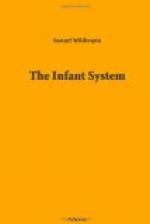CHAPTER VIII.
MUSIC.
Infant ditties—Songs on natural history—Moral lessons in verse—Influence of music in softening of the feelings—Illustrative anecdote.
* * * * *
“Music hath charms”
* * * * *
Music has been found a most important means of mental and moral improvement. Its application took place from my finding a great difficulty in teaching some children, especially the younger ones, to sound their letters; and hence I determined to set the alphabet to a simple tune. I sang it frequently to the children when they were low or dispirited, and although none attempted the same sounds at first, I had the satisfaction of observing unusual attention. My next effort was very injudicious; for I urged on them the imitation of these sounds before they were actually capable of so doing; and hence, as more reflection would have shewn, only discordance arose. Having told them then to listen only, as they did at first, I soon discovered that having learned the tune through the proper organ—the ear, they were able to imitate it with the voice. We then by the same means marked the distinction between vowels and consonants with a tune that was longer and rather more difficult. As the monitor always pointed out the letters in succession while the children were singing, attention was excited and secured, and error effectually prevented, as correct time and tune could not be kept unless every child sung the right letter.
Success as to the alphabet led to the adoption of music in the teaching of arithmetic. This was available in two ways, first by combining with it physical exercise, and then by tasking the faculties of observation. The former was effected as follows: the children sang, one is the half of two, two is the half of four, three is the half of six, &c. &c., and then brought one hand down on the other alternately, without however making too much noise, so as to interrupt the time; the latter was accomplished by the arithmeticon, which has already been explained. A few specimens of the ditties thus used shall now be given; and several others, both hymns and moral songs are to be found in the Manual, recently published by myself in conjunction with a friend.
FOUR SEASONS FOR HUMAN LIFE.
Our days four seasons are at most,
And Infancy’s the time
of Spring;
Oh! with what trouble, care, and cost,
Must we be taught to pray
and sing.
In Summer as our growth proceeds,
Good fruit should hang on
every branch;
Our roots be clear’d from evil weeds,
As into knowledge we advance.
Our Autumn is the season, when
Temptations do our minds assail.
Our fruits are proved in manhood; then
Let not sin, death, and hell
prevail.
For Winter brings old age and death,
If we’ve good fruits
laid up in store;
Soon as we gasp our latest breath,
We land on a triumphant
shore.




